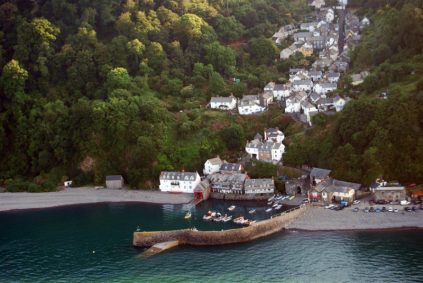The picturesque fishing village of Clovelly is one of the most iconic settlements on the North Devon Coast. This traffic-free village is famous for its steep cobbled street, donkeys and sledges which are used for delivering goods to the houses! Here the visitor gets a real taste of the past, the buildings are little changed and the village is set within a steep valley surrounded by stunning coastal woodlands. Traditionally an important fishing village, Clovelly was famous for its herring. Clovelly’s fishing heritage is celebrated today in several annual festivals.
History
The village is privately owned, originally by the Carey family and later by the Hamlyns. This private ownership has helped retain a genuine village community in an authentic and atmospheric setting. Hundreds of boats once worked out of Clovelly, working through the night before bringing in their haul, with women and children helping to shake the nets. Herring were caught using numerous small traditional boats called Picarooners, a word said to be derived from the Spanish ‘picarón’, meaning rogue or robber, due to the fact that these small boats could put to sea when the tide prevented larger vessels; ‘stealing’ the fish.
Landscape and nature
Aside from the wildlife interest of the coastal heath and woodland surrounding Clovelly, if you’re lucky you can still see mackeral shoals electrify the waters on a still summer evening, and often spot porpoises playing in the bay.
Small fishing boats still work out of Clovelly and wildlife cruises also operate from Clovelly harbour. Ask locally for details.
Arts and Culture
Charles Kingsley moved to Clovelly at the age of 12 when his father became the local vicar. He retained a deep connection with Clovelly and returned to the area many times over his lifetime.The influence of the area inspired him to write Water Babies and Westward Ho! together with the following famous poem after a fishing tradgedy in the Bideford Bay:
“Three fishers went sailing away to the West,
Away to the West as the sun went down;
Each thought on the woman who loved him the best
And children stood watching them out of the town.
For men must work and women must weep
And there’s little to earn and many to keep
Tho’ the harbour bar be moaning.
Three wives sat up in the lighthouse tower, And they trimmed the lamps as the sun went down.
They looked at the squall, and they looked at the shower,
And the night-rack came rolling up ragged and brown
But men must work and women must weep
Tho’ storms be sudden and waters deep
And the harbour bar be moaning.
Three corpses lay out on the shining sands,
In the morning gleam as the tide went down,
And the women are weeping and wringing their hands
For those who will never come home to the town.
For men must work and women must weep
And the sooner it’s over, the sooner to sleep,
And good-bye to the bar and its moaning.
Clovelly was also visited by Charles Dicken who described clovelly as a fictional town called steepways in “A Message from the Sea” (1860).
Clovelly is also depicted in a famous picture by Turner now owned by the National Gallery of Ireland, Dublin.
Amenities
Refreshments are widely available in the village and harbour. Car parking is available at the Clovelly Visitor Centre at the top of the village. Landrover taxis can be taken to the harbour, otherwise it is a steep walk down 120 metres of cobbled street – and back again! Well worth the effort, if you’re capable of making it. There is an admission charge to enter the village, which includes car parking fees & entrance to the village museums.
Activities
A classic spot for sight seeing and walkers. There are regular festivals and events throughout the year.
Why not find out more about the history in the visitor centre museum?
Clovelly Donkeys
Beach Information
Weather & Tides


